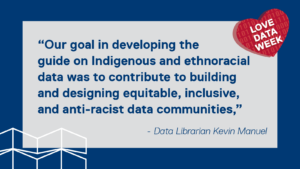 Exposing the complex history of data collection and the Census of Canada
Exposing the complex history of data collection and the Census of Canada
Looking for data to support research on racialized people and Indigenous groups in Canada? It might be worth a long scroll through the history of the Census of Canada–its origins, practices, terminology and evolution as it defines, in part, how we view and explain Canada.
Data Librarian Kevin Manuel, with co-authors Data Services Coordinator Alexandra Cooper, Queens University Library, and Data Services Librarian Rosa Orlandini, York University Libraries, recently had their 2022 research article “Who is counted? Ethno-racial and indigenous identities in the Census of Canada, 1871-2021” published in the open access journal International Association for Social Science Information Service and Technology (IASSIST) Quarterly’s special issue on Systemic Racism in Data Practices.
Outlining obstacles researchers face when looking at datasets, the authors review the Census’s modifications to terminology and the ways in which it has asked entho-racial origin questions, noting that “the collection of racial, ethnic, or Indigenous data has changed throughout the years and from Census to Census.”
Since 1871, the Census has been used to collect socio-demographic data, and as a tool to understand where, how and who lives in Canada. Information collected is used to help direct funding for resources and inform policy. However, who is included and how, has significantly impacted the snapshot(s) of Canada, and has created obstacles for researchers working on understanding Indigenous and racialized groups, and their experiences.
Going back to the beginning, Manuel et al., examine when and how Indigenous and entho-racial identities started to be included, and how. In 1911, the Census began collecting information on new settlers, but excluded racialized and Indigenous groups. As it evolved, data collection expanded to include ethno-racial groups and with it changes to terminology and questions. Terms, at different times, included: place of origin, racial origin, ethnic origin, ethnic or cultural group, but distinctions between these terms has not been clearly defined. While expanding, confusion regarding what that meant, remains.
For researchers looking to the Census for data specifically on Indigenous groups, understanding its history is equally important. It wasn’t until 1986 that questions related to Indigenous identities were asked separately from racial and ethnic origin questions. Previous to 1986, questions regarding Indigenous identity appeared under ‘origin’ as ‘Indian.’ A term in which immigrants from India would have also related.
Further confusing datasets, the Census required Indigenous peoples to follow ancestral lineage, but how varied from year to year. For example, in 1941 and 1951 respondents could mark ‘Indian’ or ‘Eskimo’ based on their father’s origin. Other years, ‘origin’ was based on maternal ancestry.
It is important to note that today Métis, Inuit and First Nations are recognized as Indigenous peoples.
As a data librarian, Manuel is all too familiar with the complexities and systemic racism present in collecting, finding, researching and understanding how data is organized, as well as how it varies between sources and from country to country (there are no international standards).
“It is challenging for researchers comparing Census data over time to examine Indigenous and ethno-racial data as the classifications have changed significantly from the colonial era to the present,” says Manuel.
To help address some of the issues in researching historical data, Manuel, Cooper and Orlandini created a ‘Data on Racialized Populations’ guide available publicly on the Scholars Portal.
The guide is “a curated list of datasets that include ethnicity and race variables which can be used to facilitate anti-racism research in Canada,” and is intended as a starting point for researchers.
“Our goal in developing the guide on Indigenous and ethnoracial data was to contribute to building and designing equitable, inclusive, and anti-racist data communities,” says Manuel.
While the guide provides an invaluable resource, there remains much work to be done in identifying and understanding systemic racism in data collection and bringing about change. In addition to this work, Manuel is the program co-chair of this year’s IASSIST 2023 Conference. The theme of the 2023 conference is Diversity in Research: Social Justice from Data.
In continuing to work towards building more equitable data communities, the conference’s theme intends to address issues in data collection, and shine a light on obstacles faced in searching datasets. “We hope to achieve greater inclusivity of presentations and discussions about data that is collected regarding people that are marginalized, and set a precedent for embedding more diversity in our conferences going forward,” says Manuel.
Data Librarian Kevin Manuel is hosting a presentation and discussion (Feb. 16) during Love Data Week titled: Who is counted? How to use the Census of Canada timeline to search for ethno-racial and Indigenous identities
Learn more and register